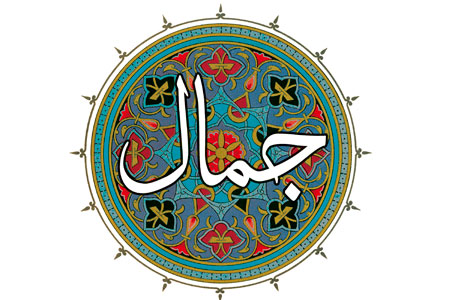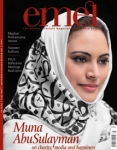
The Beauty of Islam
Issue 93 June 2012
Imam Zaid Shakir
Death and destruction tend to be associated with Muslims, but the Prophet reminded, “God is Beautiful and He likes beauty.”
For many people, including some Muslims, it has become difficult to associate Islam with beauty. The popular view of Islam is based largely on images conveyed by the mass media, and those images are usually repugnant. Such images may include the carnage wreaked by suicide bombers upon unsuspecting crowds of innocent people in mosques, bazaars and other public gathering places. They may include the faces of women that have been mutilated or disfigured by acid or blades owing to some un-Islamic concepts of honour, ownership or worse. Those images may include the distorted visages of angry men railing against outrages or atrocities that their anger does little to alter or abate.
In short, the images usually associated with Islam and Muslims are those of death, destruction, harshness and anger. Rarely do we see images of life, gentleness and happiness. Indeed, many Muslim societies are challenged by scourges such as war and famine, and the pictures painted by such afflictions, usually, are not beautiful. This is a reality that transcends religion.
However, even in those societies there are heroic struggles being waged daily that highlight the dignity that still characterises most Muslims. A discerning photographer or videographer could readily capture many of the countless beautiful images those struggles give birth to. Unfortunately, in far too many instances, those capable of doing so are frequently charged to capture images that reinforce the most negative stereotypes associated with Islam and Muslims.
That being the case, each and every one of us has a responsibility to do what we can to counter the prevailing stereotypes and to present an alternative image. To do that effectively, we have to realise just how beautiful our religion is and then begin to articulate that beauty in all that we do. The Prophet, peace upon him, reminded us that God is beautiful and that He loves beauty (Muslim). Similarly, he reminded us of the incomparable beauty of Paradise; most powerfully when he simply stated, “God has prepared for His righteous servants [in Paradise] what no eye has ever beheld, no ear has ever heard, and what no human heart has ever imagined.” (Bukhari)
Historically, Muslims have endeavoured to capture the beauty of the Divine as well as the beauty they believed to exist in Paradise in everything they did. As a result, the most beautiful art, architecture, music, literature, cuisine, gardens, homes, dress, and cities adorning the pre-modern world were those crafted by Muslim hands. Even today, after centuries of decline, the carpets, calligraphy, cuisine, tile-work, and other manifestations of brilliant Muslim cultural creation are the most sought after on earth.
Perhaps more importantly, Muslims always strove to be beautiful people. Some of our greatest scholars wrote books encouraging the believers to adorn themselves with the beautiful names and attributes of God—to the extent humanly possible. Morality and character reformation were great goals that helped to define the very essence of Islam. Such an emphasis was never seen as an inauthentic appendage to the pure teachings of the Qur’an and the Sunnah of the Prophet, peace upon him. These teachings were found at the very heart of the Revelation.
God addresses His Beloved Muhammad, “Verily, you are established on an exalted standard of conduct.” (68:4) He then reminds us, “Surely, the Messenger of God is a most excellent example for any of you who puts his hope in God and the Last Day and remembers God much.” (33:21) The truly successful believer is one who follows the prophetic example and endeavours to adorn herself or himself with beautiful and virtuous character.
The Prophet, peace upon him, also described God as good when he mentioned, “God is good and He only accepts goodness.” (Muslim) Muslims strove with might and main to be good people. By so doing, they were people of character and integrity, hospitality and fidelity, kindness and generosity, courage and honesty. Their character impressed itself on all who visited the Muslim world when Muslims lived in societies that bore the distinct stamp of a viable Islamic civilisation. It was the strength of their character and not the force of their arms that was most instrumental in the spread of Islam over vast expanses of the globe.
Now that the civilisation fostered by Islam has been eclipsed by that of the West, the best thing we can do is to make sure that we continue to represent the best of what our civilisation embodied. Although the cultural achievements we mentioned earlier are laudable, the most telling embodiment of Islamic Civilisation lay in the beauty, goodness and character of its people as defined by their ethical system. This is true of any society, nation or civilisation, as mentioned by the great Egyptian poet, Ahmad Shawqi, when he wrote, “Nations are none other than the ethics they embody. When their ethics go, they will soon follow.”
What the poet mentioned is particularly true for the Muslim community, in that its ethical system is based not so much on the characteristics that are peculiar to a specific people. Rather, it is based on principles and knowledge that can be adopted by any people in any time and place. Hence, unlike the Egyptian, Hindu, Mesopotamian, Greek, Roman, Mayan or other civilisations, Islamic civilisation is mobile and can appear anywhere. Thus, over a period of more than 1,000 years it has had Arab, Persian, Turkish, Indian, European and African iterations.
Having said this, we should not be deceived into believing that a revival of Muslim civilisation lies in the achievement of political power or strategic domination and become obsessed with the attainment of the mechanisms usually viewed as essential for their attainment. No revival will be possible without the revival of the ethical system that undergirded the beautiful character and goodness of the Muslim people when their civilisation was the envy of the world.
Beautiful character, in this regard, should not be seen as lying in philosophically titillating abstractions. It is oftentimes manifested in the simplest things. A gentle smile extended to a soul longing to be loved. Patiently enduring the abuses and insults of the ignorant, while endeavouring to educate and inform them with the best manner possible. The loving embrace of a spouse fatigued after a long day competing in what has all too fittingly been described as the “rat race.” The selfless consideration of the best interests of one’s relatives, neighbours, and when relevant, even a stranger. A quiet but determined commitment to reading, learning and critical thinking as the foundation of a life lived in the light of truth and moral excellence. It is further to be found in the willingness to sacrifice something of our present for the sake of our children’s future.
These, and other acts we could mention, are all concrete manifestations of high character and we could of course find numerous citations from the Qur’an and prophetic Sunnah to magnify their significance. A point to note here is that these are the things we can control. Hence, they should demand great commitment from us towards their attainment.
The Prophet, peace upon him, mentioned, “A person’s Islam being good involves him leaving what does not concern him.” (Tirmidhi) Among those things of no concern to us are the things beyond our control. This is particularly true in strategic affairs. Ultimately, it is God who will determine which nations will be tested with strength and which will be tested with weakness. It is clearly stated in the Qur’an, “Say, God, the possessor of all dominion! You extend dominion to whosoever you will and you remove it from whosoever you will. You elevate whosoever you will and you debase whosoever you will. In your hand is all good. Surely, you have power over all things.” (3:26)
When we become obsessed with the attainment of what can only be given by God, we find ourselves more willing to make the kinds of compromises that negate the beauty of our character. Such compromises are not confined to issues related to war and peace; they extend to our entire affair. For example, obsession with the wherewithal of the world leads us to dishonour our contracts, cheat on our taxes, misrepresent our financial situation to remain on the dole, sell illegal drugs and alcohol and engage in other acts that not only sully our individual reputation, but when widespread in our communities make the Muslim community itself seem ugly in the eyes of others.
Finally, it is unacceptable for us to use the excuse of the ugliness of the world for our lack of beauty. If enough of us are committed to bringing to the world as much beauty as we can then the world will be a more beautiful place. It will never be perfect. However, the light of our beauty will help to hide the darkness of its imperfections. This is the surest path to an Islamic revival.
“O the complainant who suffers no malady! Be beautiful yourself and you will see beauty in all of creation.” Ilya Abu Madh
Bookmark this |
|
Add to DIGG |
|
Add to del.icio.us |
|
Stumble this |
|
Share on Facebook |
|
Share this |
|
Send to a Friend |
|
Link to this |
|
Printer Friendly |
|
Print in plain text |
|


Comments
0 Comments